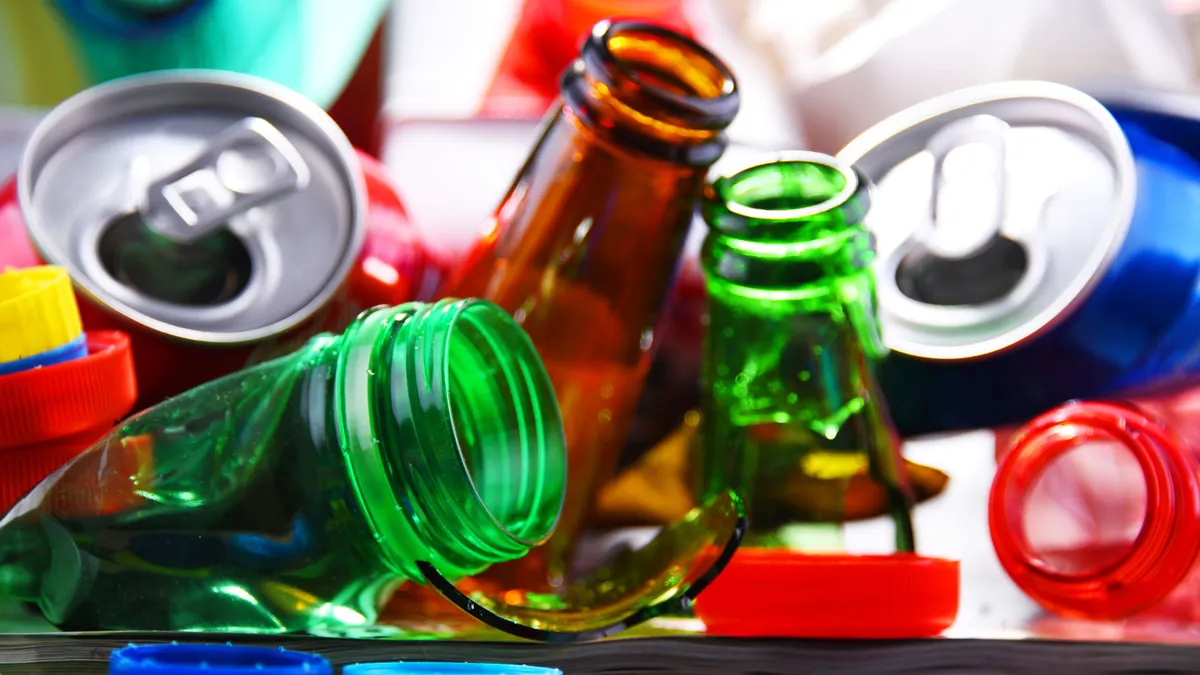Welcome to Scrap Collector, Waste Dive's Friday round-up of insights and stories you may have missed during the week.
EXPERTS WEIGH IN ON "ABSOLUTE WORST TRASH THAT HUMANS PRODUCE"
It's always nice to find fellow waste aficionados eager to do some trash talkin' — so when we saw Earther's Daniel Kolitz asking experts to identify the world's most toxic, impactful human-made waste, we nearly tripped over ourselves to see what they had to say. Here, for your consideration, are the contenders:
CARBON DIOXIDE
According to Jan Zalasiewicz, a professor of paleobiology at the University of Leicester, the most dangerous trash — much like the scariest horror movie monsters — is "the one we cannot see, or feel, or smell, or touch."
The trillion tons of carbon dioxide in the atmosphere — trash left over from our ongoing love affair with fossil fuels — is altering Earth's heat balance and acidifying our oceans, "slowly driving life-giving oxygen away from them." This is waste that poses a fundamental existential threat to both the planet and its inhabitants — and, Zalasiewicz notes, it's time to clean up.
HIGH-LEVEL NUCLEAR WASTE
Travis P. Wagner, a professor at the University of Southern Maine’s Department of Environmental Science & Policy, previously spoke to Waste Dive about the growing threat of plastic pollution — but his vote for world's worst trash goes to high-level radioactive waste.
The radioisotopes produced in reactors can remain hazardous for thousands of years (the U.S. EPA has set an acceptable emission standard for the first 10,000 years of storage), but we still don't a long-term strategy for managing nuclear waste or any working technologies that can fully neutralize it — even as the U.S. continues churning out approximately 2,000 metric tons of the stuff per year. Essentially, we're banking on our ability to store mushrooming amounts of highly toxic waste for 10,000 years without any leaks — as Wagner says, "fingers crossed."
PLASTICS
Joseph Gardella, a chemistry professor at SUNY Buffalo, works with contaminated industrial sites and radiologicals from WWII uranium production — but he points to plain old plastic as the "most insidious and dangerous trash."
"We have invented plant-based plastics that biodegrade, but the subsidies we as a country and society offer to the petroleum industry keep us stuck with ancient technology because it’s 'cheaper,'" laments Gardella, noting escalating issues with microplastics and marine pollution.
R. Ryan Dupont, a civil and environmental engineering professor at Utah State University, also casts a vote for plastics — especially single-use plastic bags and films, which are "generally a nuisance everywhere they are found."
OUR TRUTHS ARE RELATIVE, AS IS OUR EXPERIENCE OF TRASH
"Here’s the thing: there is no universal human who creates the same trash of the same type, tonnage, or toxicity everywhere on Earth. There is also no universal human experience of the harms from different kinds or amounts of wastes and the different forms of damage they can inflict," observes Josh Lepawsky, associate professor of geography at Memorial University.
Despite the epistemological impossibility of determining an "absolute" worst type of waste, Lepawsky highlights household trash (which often contains chemicals from ordinary household cleaning products that can be "acutely poisonous and lethal") long-lasting trash such as radioactive wastes and plastics, and persistent organic pollutants (POPs) — which "harm people and wildlife at great remove and who have nothing to do with the applications to which those chemicals are put" — as some of the deadliest human-produced wastes.
Got any heavyweights in mind that could duke it out for the title of World's Worst Waste? Write in — we would, as always, love to hear from you.
IN OTHER NEWS...
Sonoma County declares hazardous waste emergency after Russian River flood — The Press Democrat
Some good and bad news re: last week's catastrophic Russian River flood in California. Good: floodwaters receded last Friday. Bad: They left behind a brew of "flood crud" — sewage, gasoline, chemicals and other hazardous wastes — prompting Sonoma County's interim health officer to declare a local health emergency on Tuesday.
The declaration allows the county to initiate curbside collection of hazardous waste, which local residents have been advised to keep separate from other trash. Still, local clinics are preparing for a potential wave of bacterial infections and intestinal bugs in the near future.
"This is about the time we start seeing that," noted Dr. DeEtte DeVille, medical director of Russian River Health Center.
Sonoma County's website has the full details on managing debris disposal and dealing with flood damage.
AROUND THE WORLD
Report: Less than a third of Australia's plastic packaging waste is recycled — The Guardian
According to a new report commissioned by the Australian Packaging Covenant Organisation (APCO), only 56% of all packaging waste in Australia — and 32% of plastics — was recycled in FY18. In other words, more than 600,000 out of 900,000 tons of plastic packaging didn't get recycled, with PET, HDPE and PVC plastics experiencing even lower diversion rates.
The study, which was conducted by the University of Technology Sydney, also determined that Australia exports 19% of its waste overseas — a "significant portion," as noted by APCO chief executive Brooke Donnelly.
"The general consensus, from both government and industry, is to move towards the circular economy. It is conceptually a wonderful thing but is very difficult to translate that into operation," she said. "We're really good at collecting it and sorting it, let's find more ways to reprocess it here and find domestic solutions."
SEEN & HEARD
The Baltimore Clean Air Act now is law. @WTIEnergy and Curtis Bay Energy now must meet the required standards, or go away once and for all. https://t.co/kVW83ndxlQ
— Clean Air Baltimore Coalition (@CleanAirBmore) March 7, 2019
"There's so much more that has happened before you've even purchased your device." @rubbishmaker talks about his research showing we need to expand our understanding of what we think of as #ewaste.https://t.co/qyTjZxGZm9
— OurStoryStudio (@OurStoryStudio) March 6, 2019
“The health of the ocean, like #climate, is trending badly. Plastics in the ocean is fixable compared to the warming & acidification of the ocean.” Thank you Peter Thompson, special envoy for th Oceans, UN, for clearly calling for action. #OceanSummit pic.twitter.com/IcuOQ3A4ia
— Keefe Harrison (@KeefeHarrison) March 7, 2019
Have been recycling since 1979, have seen a lot worse. It's a "buyers market" right now. And people are buying closed down recycled paper mills to take advantage of long term contracts. At MA DEP, I always advocated 15 year pricing models.
— Robin I (@WR3A) March 6, 2019

















